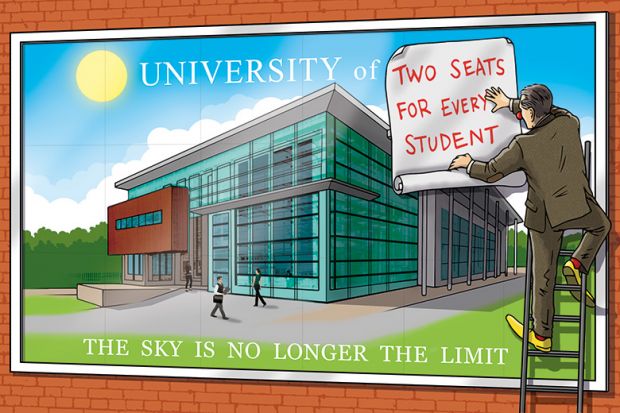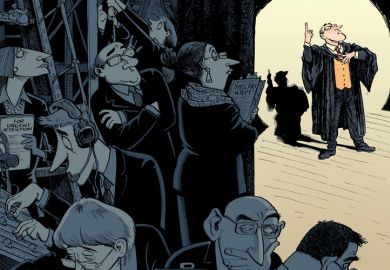What have professional services staff done to deserve such scorn from academics? Having worked in the marketing department of two well-known British universities over the past eight years, I can honestly say that the vast majority of professional staff treat academics with the respect and reverence their hard work and achievements deserve. We would never dream of telling them how to do their jobs. Unfortunately, that same courtesy is all too often denied us.
The higher education press is full of articles by academics dismissing the value of professional services staff. In 2015, for example, Laurie Taylor, the broadcaster and former sociology academic, gleefully recounted how he had told a conference of administrators that however competent they were, “their work would always be regarded by the typical academic as little more than pen-pushing”.
I bear some of the scars of such attitudes personally. My mid-ranking role requires a lot of close liaison with academic colleagues. On the whole, it goes smoothly, but I’ve lost count of the number of times I’ve had to defend my actions on behalf of the wider marketing department, explaining why we do things the way we do. So many academics seem to believe that they know better, and that the way they would do things is automatically the right way.
Welcome to the world of the have-a-go marketer. These senior academics mean well, but their actions almost always do more harm than good to their institutions’ reputations. They will, for example, bypass any established briefing system, ignore their nominated marketing officer/manager/coordinator/team and disregard carefully cultivated visual brand guidelines as they rustle up a poster for an event that they’ve just decided should happen. Tomorrow.
Or they’ll divine that what is really needed to address a shortage of undergraduate applications is a one-off advert in a magazine read by many of their peers but none of their prospective students. They will find a spare few hundred pounds in someone’s budget to act on this hunch, creating their own artwork without consulting the internal graphic designers and marketing copywriters.
Or – and this is the easiest thing for them to do because it’s quick and free – they’ll set up a brand new social media account, declare it official, and proceed to make statements that contrast significantly with our carefully cultivated tone of voice and house style.
Although they account for only a small proportion of academics, have-a-go marketers cause the professionals a significant headache and a shedload of extra work repairing the damage to the institution’s brand. By that stage, they have got bored and moved on to a new pet project. And so the cycle repeats itself.
Take the genuine example of Dr X from the department of Y. The department has been experiencing a gradual decline in undergraduate interest over the past three years. This reflects a sector-wide trend in subject Y but, thankfully, the department’s applicant conversion rate has improved to such an extent that enrolments have been relatively stable compared with other institutions.
Yet Dr X believes that the reduction of applications is a direct consequence of our substandard marketing. When pressed on what he means, Dr X can make only sweeping generalisations, such as that “our website is not as good as some of our competitors”. When presented with focus group testimony to the contrary, Dr X refuses to budge. And when told the statistics on the declining take-up of the subject at school, Dr X continues to deny that wider market factors may be at play.
Recently, I outlined a plan of action for the department. It would start with robust market insight and analysis, followed by an overhaul of student recruitment and communications activities (among other things) and culminating in a highly targeted and integrated digital campaign in the longer term. Alas, Dr X is not interested. Because Dr X knows better than a team of qualified marketing professionals armed with insight, data and knowledge of the sector.
Dr X’s alternative plan is simple yet brilliant. All we need is a one-off, half-page advert (not followed up by any further interventions) in a magazine that Dr X happens to like and that we suspect some schoolteachers of subject Y may read. This, maintains Dr X, will encourage teachers to recommend our university – although it isn’t clear why they would do so merely because they happen upon an advert for it in a cluttered magazine with a small circulation.
In some senses, have-a-go marketers are good for our office morale. Sharing stories of their sometimes very funny antics can brighten up a dull day. But that doesn’t begin to make up for the fundamental lack of respect. While academic colleagues understandably want to maintain their academic freedom, by being so confrontational and interventionist with support staff, the academic have-a-go marketers are unwittingly diminishing our own professional freedom. And that is completely unfair.
So I plead with the academic community: please let professional staff get on with their jobs. We promise that we know what we are doing – and that it will make all our lives a little bit easier.
The writer prefers to remain anonymous.
POSTSCRIPT:
Print headline: Have-a-go marketers need to show respect for professional staff
Register to continue
Why register?
- Registration is free and only takes a moment
- Once registered, you can read 3 articles a month
- Sign up for our newsletter
Subscribe
Or subscribe for unlimited access to:
- Unlimited access to news, views, insights & reviews
- Digital editions
- Digital access to THE’s university and college rankings analysis
Already registered or a current subscriber?


